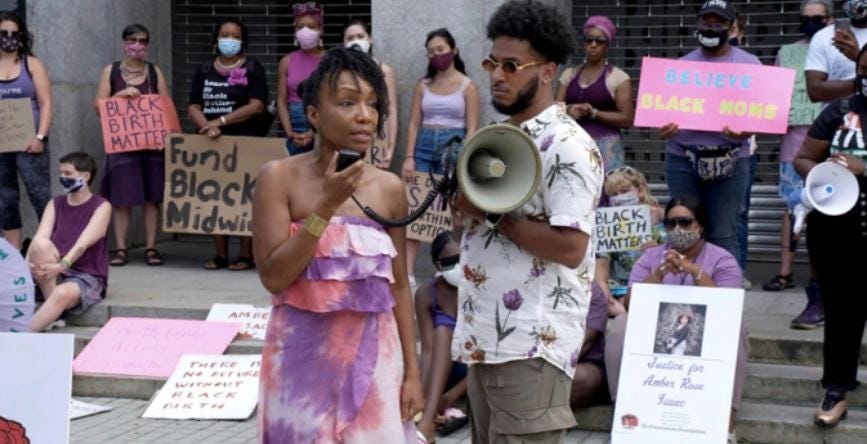Hollywood & Entertainment Documentary ‘Aftershock’ Puts Human Face On Maternal Health Care Crisis Disproportionately Experienced By Black Women Anne Easton Contributor Opinions expressed by Forbes Contributors are their own. I write about original content on all platforms New! Follow this author to improve your content experience. Got it! Jul 30, 2022, 01:15pm EDT | New! Click on the conversation bubble to join the conversation Got it! Share to Facebook Share to Twitter Share to Linkedin Shawnee Gibson Benton advocates for change in the maternal health care system following the death of .
. . [+] her daughter Shamony Gibson.
COURTESY OF SUNDANCE INSTITUTE/KERWIN DEVONISH In October of 2019, 30-year-old Shamony Gibson died just 13 days after the birth of her son. In April of 2020 26-year-old Amber Rose Isaac died following an emergency caesarian section. It was later determined that both women died of preventable causes.
The documentary Aftershock follows the bereaved families of both women as they work with activists, healthcare workers, and physicians to understand a tragically overlooked American crisis – the rise in maternal deaths in the United States, particularly among women of color. Statistics show what Black women are about three times more likely to die from a pregnancy related cause than white women. The maternal mortality rate for black women increased significantly from 2018 to 2020.
And Black women today are more likely to die of childhood complications than their parents. 60% of these deaths are preventable. The film features Omari Maynard, Gibson’s partner, and Issac’s partner, Bruce McIntyre, as the men navigate their role as unexpected single parents.
Also highlighted is Gibson’s mother, Shawnee Benton Gibson, who is now an outspoken advocate for maternal health. NEW YORK, NEW YORK – JULY 14: Bruce McIntyre, Shawnee Benton Gibson and Omari Maynard attend the . .
. [+] “Aftershock” New York Screening at Brooklyn Museum on July 14, 2022 in New York City. (Photo by Theo Wargo/Getty Images) Getty Images MORE FOR YOU ‘Dune’ Tops Foreign Box Office With Promising $77M Cume ‘Shang-Chi’ Box Office: Marvel Movie Tops $360M Worldwide 4 Series Coming To Netflix In October That Are Worth The Binge This trio is highlighted throughout the film as they work to understand what happened in their individual situations while they become activists, championing changes in maternal health through legislation, medical accountability, and art.
They, along with a group of dedicated of surviving Black fathers, midwives, and maternal health advocates, to bring about systemic change within the medical system. A shocking but true fact, according to the CDC, is that Black women are three to four times more likely to die than white women with the same symptoms. NEW YORK, NEW YORK – SEPTEMBER 19: Producer Tonya Lewis Lee attends the premiere of “All Rise” on .
. . [+] day two of the 2019 Urbanworld Film Festival at AMC25 on September 19, 2019 in New York City.
(Photo by J. Countess/Getty Images) Getty Images Tonya Lewis Lee, Co-Director and Co-Producer of Aftershock , told CBS Mornings that, “Amber Rose Isaac and Shamony Gibson went looking for help and they were dismissed when they were expressing their symptoms. ” She added, “there is a bias against brown and black people.
So, you need to be paying attention to who is dealing with you, how they’re perceiving you, and making sure that you advocate for yourself in the best way possible. In other words, one wrong move and it could cost you your life. ” The film, according to Lewis, came about because, “We needed to put a human face on the women who are dying.
We read the statistics, but they’re not numbers. They’re people. ” WASHINGTON, DC – AUGUST 28: Shawnee Benton Gibson speaks during the March on Washington August 28, .
. . [+] 2020 in Washington, DC.
Today marks the 57th anniversary of Rev. Martin Luther King Jr. ‘s “I Have A Dream” speech at the same location.
(Photo by Jacquelyn Martin-Pool/Getty Images) Getty Images But the documentary highlights hope as well, says Lewis, explaining, “We do show an amazing birth in the film by a woman who really decided [that] she was going to do the regular [birth in a hospital] thing and then made a decision to see what other options are out there for her. ” Lewis says that overall she wants Aftershock to be empowering. “I want women and families to understand there’s choice and you can give birth in many different ways.
You don’t necessarily have to do it at a hospital. And, that there are things that we all can do to improve birthing outcomes, and it’s really incumbent upon us to figure out what [those are]. ” In the film, McIntyre makes many heartfelt statements, but one in particular stands out as he says, “I can’t let Amber be another statistic.
I’m making people aware of what’s going on in these systems. I thought I was going to spend a lifetime with Amber — I wanted to give her my life. This way I’m still going to.
” ‘Aftershock’ is now streaming on Hulu. Follow me on Twitter . Anne Easton Editorial Standards Print Reprints & Permissions.
From: forbes
URL: https://www.forbes.com/sites/anneeaston/2022/07/30/documentary-aftershock-puts-human-face-on-maternal-health-care-crisis-disproportionately-experienced-by-black-women/
